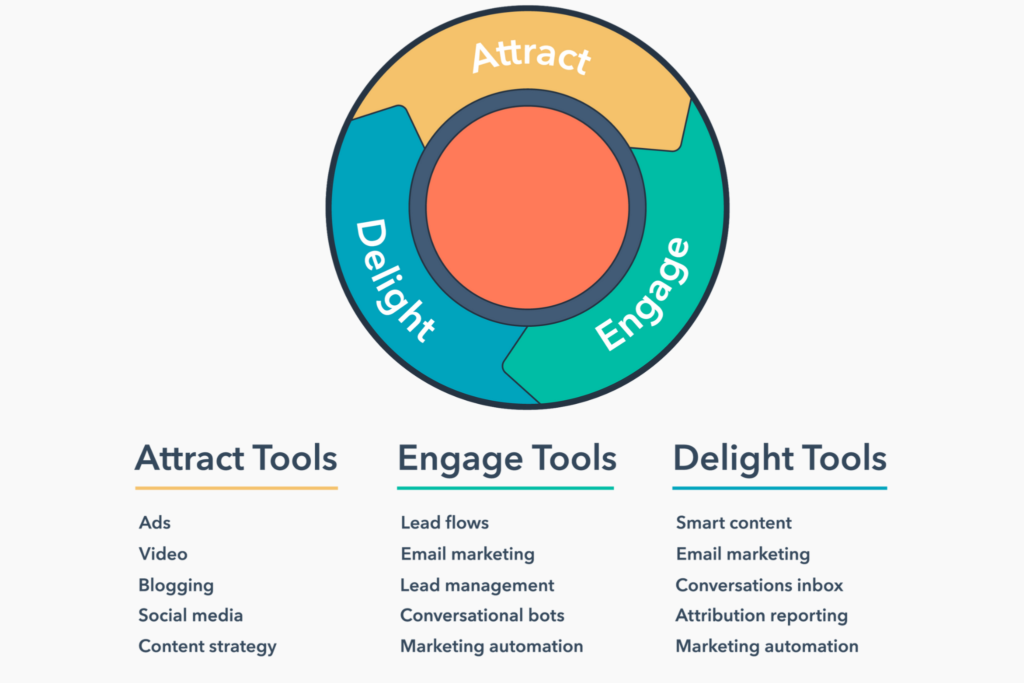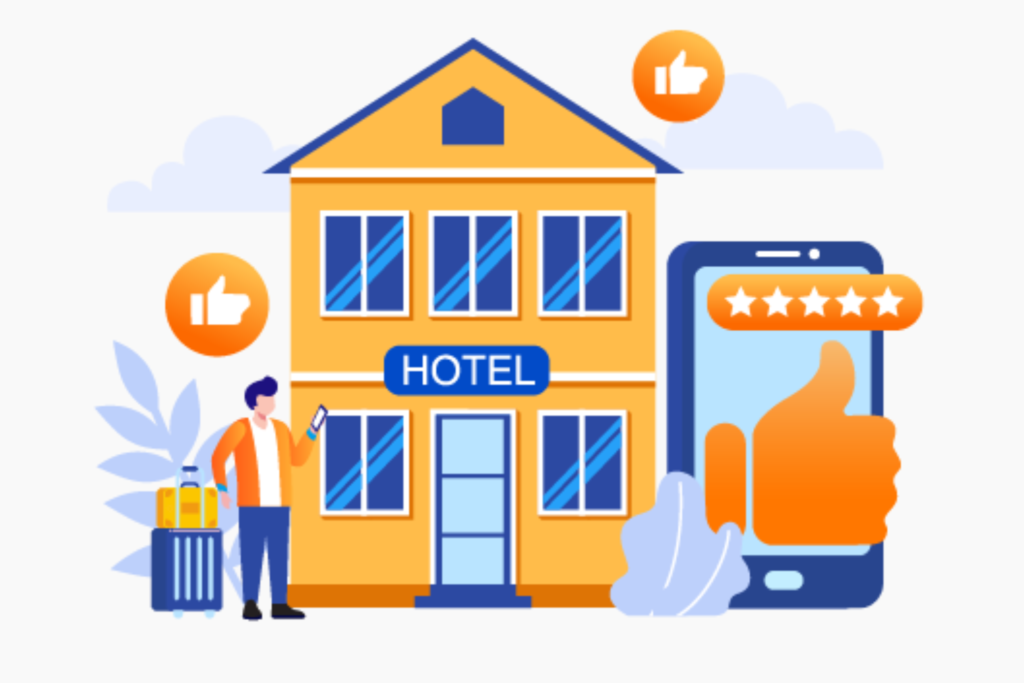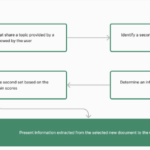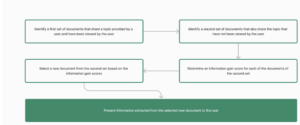Gone are the days of success without an excellent digital presence to match the excellence of your business. Think of the experience of an average person today. What is the first thing they do when they hear about a hotel, or when they simply want to search their options? They resort to the internet, the digital landscape.
Whether it’s search engines, social media platforms, or any kind of website that prospective guests are browsing, the choice they make ultimately depends on the hotel with the best marketing strategy. No matter how incredible your facilities and services are, you are only as strong as your digital marketing strategies.
In this handbook of successful hotel marketing, we will go over the most up-to- date and effective methods and strategies, the surefire ways to set your business upfor growth and prosperity.
Hotel Marketing 101: Basics
Let’s begin with the very basics. What do we mean when we say hotel marketing? How does it benefit businesses in the hospitality industry? What are some key terms to get acquainted with? (hotel marketing strategy)

How essential is hotel marketing really? Are there any proven studies and data proving its benefits? in this section, we’ll cover the answers to these questions.
What is hotel marketing?
In the most general sense, hotel marketing refers to all strategies to promote the goods and services of your hotel to potential clients. To put it more simply, it is communicating the right messages to the right people at the right place and time. It connects the product with the buyers.
Why do you need hotel marketing?
There is a lot of effort and finesse going into the maintenance of a hotel business and providing the best experience possible. Of course, you would want your efforts to be recognized and ultimately pay off.
Hotel Marketing in Numbers
More than 148.3 million people use the internet to make reservations for their accommodations, tours, and activities. That’s more than 57% of all travel reservations each year! (Statistic Brain)
51% of US travelers who decide to go on a trip spend up to seven days conducting research. (Facebook, 2019)
60% of leisure and 41% of business travelers are making their own travel arrangements, generally via the internet. (Amadeus)
20% of all Google searches are about local information. (HubSpot)
85% of customers expect businesses to be active in social media. (Vocus)
82% of consumers trust a company more if they are involved with social media. (Forbes)
65% of tourists book hotels reservations for the same day on a mobile device (Statistic Brain)
97% of millennials will share travel experiences on social media, with 2 in 3 postings once a day. (Condor Ferries)
62% of leisure travelers and 74% of business travelers will want to see a video before they make a final decision (Frederic Gonzalo)
Interestingly, hotels that are using virtual tours are getting up to a 135% increase in online revenue. (PwC, 2019)

Inbound Marketing
As consumer behavior and habits are evolving, so are marketing trends.
The last decade has seen the rise of a new approach, different from the in-your-face slogans, jingles, and various aggressive commercial strategies.
This latter traditional approach is now called outbound marketing because it works outwards – pushing the message towards the customers.
The new method is called inbound marketing, a term coined by HubSpot in 2006 to describe “pulling” the customers towards the product rather than, say, knocking on their door to sell your product. It works well because it’s less expensive,
has a higher ROI (return on investment),
and nurtures customer loyalty.
Now let’s explore how this translates into marketing practices, and how it works for the hotel industry.

What is inbound marketing?
The basic logic of inbound marketing is offering value to specific audiences and appealing to their needs, presenting solutions to their existing problems. HubSpot, the forerunner of this strategy has discovered 92.3% of companies using inbound marketing have increased traffic to their websites and found that blogging is the most effective method.
There are three pillars to successful inbound marketing:
- Attract: offer valuable and eye-catching content, capture the target audience
- Engage: meet customers’ needs, offer solutions, conversate
- Delight: satisfy the current audience with consistent positive experiences, earn loyalty
The three pillars complement each other in a circular manner. At every moment you should have strategies to attract new prospects, strategies to engage with the leads and turn them into customers, and to maintain the relationship and
transform them into regular, loyal customers with strategies to delight.
This brilliant cycle minimizes your costs and efforts to capture quality leads since it attracts those who are already interested in your services and goods. The next step, then, is to give them reasons to stay and actually make a purchase. Again, it’s much easier because the leads come to you in
the first place. Just cater to their demands and needs, and show them you care. The final stage helps you build a base of loyal customers, and all you have to do is go
that small extra mile, put in that extra touch to really cement their trust in your brand.

Inbound marketing tips for hotels
Here are some tips and tricks on how you can use inbound marketing to organically boost your brand awareness and stand out among your competition:
- Create guest personas to understand your target audience and reach them in the right place. Make multiple personas and sketch out specific strategies for each group. You can use analytics tools, interview your staff and look into guest reviews.
- Use your website and social media to be a “hub” for local attractions and the services specific to your enterprise. Make sure to create a blog, and include beautiful visuals – photos, videos, evena VR tour option if possible.
- SEO is your best friend. The first place your prospective guests look at is most likely search engines. Know your target, do your research and make sure to optimize your content (see the “SEO” section below for detail).
- User-generated content is also your best friend. People tend to take other people’s opinions more seriously than they do of brand-generated claims. Encourage your guests (and leads) to post about you (see the “Content” section below for detail).

Search engine optimization (SEO) is by now a routine procedure for all businesses
going digital, which aims to improve the ranking of a website on search engine
result pages (SERP). Basically, you want to be on Page 1 of a Google search related to your services. That page is the digital equivalent of the shiny gigantic billboard standing at the very center of, say, Times Square. Maybe even better, because SEO
is about appearing before people who search for a specific product, who make a specific inquiry.
What is SEO’s importance for hotel marketing
According to a survey, the first result on a search engine always gets approximately 33% of all clicks, whereas this percentage goes down to 18.6% for the third result, and even lower as you scroll down. A successful SEO strategy will help you make your way to the top of result pages and increase organic traffic to your website.
At this point, you cannot have a marketing strategy without SEO because over half of website traffic comes from organic search. Think of it as the infrastructure of your sales pipeline. From the first step to the last, SEO helps you reach your audience (or rather, help them reach you).
How does SEO work on hotel websites?
We have mentioned it a few times already, but what does SEO-appropriate mean? SEO has to do with the writing and structuring of content on websites because this is what search engines “read” when they are scanning websites to find the best fit for specific inquiries with specific keywords. There are certain ways to adjust your website so that it ranks higher on result pages.
When it comes to hotel marketing, a key factor for success is local SEO. Most
people searching for accommodation would make an inquiry with specific locations. For example, you wouldn’t just type in “hotel” to plan your trip, but rather “pet-friendly hotel in Paris”.

Website
Two-thirds of online travel booking sales are made directly from the hotel’s website. This means the hotel website is not merely a “digital information booklet” but the sales booth itself. It is also your best means of making sales, for there are no cuts or commissions as when agencies or other third parties are involved.
In this section, we will go into the details of mastering the website as an inbound marketing powerhouse.
What is the importance of a website for a hotel?
In 2020 an estimated $817 billion of bookings were made online, which amounts to the largest share as the sector is worth $1.2 trillion in total. Your website is the backbone of your digital brand identity, and it can be the make- or-break factor in whether online visitors will be converted to customers.
For a large number of people, it will be their first encounter with your business. If you use that first impression wisely, you can make a huge difference in conversion and retention rates.
Of course, it depends on what kind of target customers you have, what specifics you have to offer. In order to decide which keywords fit your purposes, you should do some research, and create an SEO strategy using your market insights. You can have hundreds of keywords, but of course, you can’t fit them into one page. You will have to rank them according to their relevance, and search volume (how many people use those keywords) and distribute them to your website. Having a solid content strategy is essential for successful SEO practices. But more on that later.(hotel marketing strategy)
- Always begin with keyword research. Use keyword research tools to map out the phrases with the highest search volume, and plan which ones to use extensively on your website and social media.
- Go local! Use locally specific keywords both on your landing pages and in the content you regularly create. Including details on the local attractions, activities, experiences, events, and transportation means are good for local SEO.
- Don’t be repetitive and robotic just to load up on the keywords. The algorithm also prioritizes value and uniqueness, and doesn’t favor this practice called “keyword stuffing”.

How well-adjusted your website is also determines the digital visibility of your brand, and hence overall brand awareness. Think of how much planning goes into the personnel training, the interior design of buildings, the uniforms, down to the smallest things such as your logo, souvenirs, napkins, etc. As the saying goes, the devil is in the details and making those details look seamless and effortless.
While on surface-level the visitors’ aim in viewing your website seems like getting information on your services and facilities, they’re actually assessing your professionality, approachability, and how customer-oriented you are. Hotel stays are quite a big deal for many. They allocate hard-earned money and precious time and want to get their money’s worth. Hence you should make use of every encounter and guarantee them an experience that will be worthwhile. It starts with your digital shopfront – the website.

- Create a “Google My Business” account to optimize your online information. It gives a great SEO boost to your business and helps visitors easily see the specific location, address, and essential details to help them decide. SEO is dynamic. Keep track of demand and search, ensure to change your keywords, set your rates, and plan your campaigns according to seasonality and important dates, events. You can get help from Google Analytics.
- Make sure that your social media and advertisements are also optimized for the most exposure on SERP (see the sections on social media and advertising for more detail).
- Google has had a new system for hotels and booking websites since March 2021 which allows them to appear alongside meta search results in organic rankings. You don’t have to do anything special to rank higher. In fact, you should put your real price range to be included, but make sure your rates are competitive. Make sure you have an effective landing page with a smooth booking engine.(hotel marketing strategy)
Content is the king
By now we have mentioned the shift towards inbound marketing. If inbound marketing is the new paradigm, content is the new weapon of marketing. The way to attract and retain customers is to give them something that they can actually use, that has value and not just promotional messages.
What is content in hotel marketing?
For a successful content strategy in hotel marketing, you should first ask “Who am I trying to reach? What are their needs that I can help with, that are associated with my services?” The first step is understanding your target audience and their needs.
Then you can decide the direction you want to take, what types of posts you will create, and where.
The next step is getting into the technical specifics – what format you will follow, which platforms you will use and how frequently. There are various options to choose from, such as newsletters, e-guides on how to plan a trip and what to know before coming to the destination, a consistent social media presence (see the social media section below), and integrating a blog into your website. It may sound like a lot of work, but with the proper planning, it can work like a clock in the long term as a cost-efficient and effortless means of promotion.
- Tips to create engaging content Create your “guest personas” and use them to determine the types of content you want to create. You are catering to the needs of your prospective customers, so keep it customer- oriented.
- Repurpose existing content to save time. The same message can take on new meanings when you share it on different platforms, and with different formats. Do you have a text post? Make it an infographic or a kinetic typography post (videos with moving texts).
- Promote user-generated content. Re- share and encourage photographs shared by guests, video blogs on YouTube, and online reviews. People tend to rely on organic opinions rather than promotional messages by businesses.
- Encourage your guests to create content including your brand. Put up a digital photo booth, give out freebies for tagging you on a post.
- Invest in a content management system (CMS) to make your job easier. Adding a WordPress-powered blog on business websites is one of the most effective content strategies.
Advertising
Traditional marketing techniques aren’t dead (yet), they just evolved with the technologies and changing digital practices. As we discussed earlier, it’s all about inbound marketing these days. This also applies to advertising. With ever- growing data analytics, users are segmented down to the very details of their demographics and interests.
Great news for marketing, because it means you can hit the bulls-eye with targeting your audience.
What are different options for hotel advertising?
The world of digital advertising comes with a variety of options, and the best strategy would be to try everything and see which one works best for you. Of course, there
are certain means that work better for hotel advertising, and we will talk about the tips and tricks in this section. Search engine and email marketing should be at the top of your priority, for example, because this is where the majority of the sales in the hospitality industry comes from.
Here are some of the most frequently used advertising in the hotel industry:
Online travel agencies (OTA)
Online travel agencies are very popular among customers as it offers a one-stop- shop to search, compare and book among a wide range of options. They are also preferred because of special travel packages, flight tickets, activity bookings, and car rentals that are included. The key here is finding the right OTA for your target market and business goals.
Display ads
Display advertising generates 31% of ad- based bookings according to a 2020 report. Hence it still has a significant place in advertising strategies. Display ads are banner or text-based ads placed on websites, mobile apps, and social media that are charged on a pay-per-click basis. HTML5 animated banners have a 13% higher click-through rate than static ones.
Tips for effective hotel advertising
Facebook and Instagram have effective segmentation and targeting tools which connect brands with quality leads. Try Facebook Travel Ads for a well-targeted campaign.(hotel marketing strategy)

Google Ads
Google has implemented a new system for hotels earlier this year which displays availability and prices on Google search, maps, and assistants. You simply create a Google Hotel Center account and add your price and availability information, as well as specifics of your services and the locality that can help customers discover you. You can also create an ad campaign with Google’s extensive campaign management and analytics tools.
Meta search ads
Meta search websites enable guests to compare different prices on multiple websites from one platform according to their preferences. They are often preferred by travelers to find the cheapest and most convenient option available. To be enlisted on the websites hotels either pay on a cost-per- click (CPC) basis or a cost-per-acquisition (CPA) basis.

- Create a captivating, share-worthy video campaign on social media. Combine it with viral trends to achieve maximum visibility. For example, many brands are using TikTok challenges to reach Gen Z audiences.
- When properly done, pop-ups can be very persuasive. Exit pop-ups have the highest conversion rate as they create a sense of missing out on special discounts.
- Think outside the box. Try new formats and get creative with your visual and textual ads that will stand out among traditional marketing campaigns.
- Be mindful of local and demographic factors, create multiple ads for different targets. You can try A/B testing to see how various versions of your ads play out.
- Try influencer marketing, even the leaders of the hospitality industry (Marriott, Hilton, The Ritz Carlton) make use of it.(hotel marketing strategy)

Email is still alive and kicking, and a very frequently used means of communication. Thanks to automation tools and design templates you can create beautiful and personalized emails that reach out to your customers at the right time and encourage them to book your hotel. A solid email strategy that mainly targets your previous customers and leads that are already interested in your service can generate a lot of revenues.(hotel marketing strategy)
What is the relevance of email marketing for hotels?
Especially for the hotel industry, email marketing is the channel with the highest return on investment (ROI). In fact, it’s estimated to return $38 for every $1 spent. Among millennials 73% report that they prefer communications from businesses to come via email.
With email marketing, you can boost your brand awareness with timely emails and build trust, encourage them to directly book from your website with strong calls to action (CTA), and win your previous guests to repeat business.(hotel marketing strategy)
Tips to optimize emails for better engagement
Optimize your send lists. Include an email form on your website and ask your guests during their stay on physical forms or wi-fi signup sheets.
- Attracting new guests is much costlier (approximately five to eight times more!) than retaining your existing ones. Target your loyal customers.
- Take advantage of peak periods and seasonalities. Send out holiday-themed emails and discount offers for early booking etc.
- Use strong calls to action with a sense of urgency, calling the customers to “act now”, for example through limited-time offers. Invite them to book directly on your website for special discounts.
- Be engaging, ask for feedback and send emails that require taking action.
- Capture the attention of your audience economically. Be clear and precise, but creative. Nobody has time to read long, dull emails.
- Target your audience well and choose your material in a way that speaks their language, and addresses their needs.(hotel marketing strategy)

Social media is a great way of directly engaging with your prospective and current customers. It is the backbone of creating brand awareness and adding a human touch to your identity which is often sought in service industries. It can help you promote specific services and alluring details of your hotel, as well as the locality.
What is the use of social media for hotels?
Let’s face it, what’s more, popular on social media than a good vacation selfie, a landscape photo, or a story of that delicious unique dish? The numbers speak for themselves: 97% of guests use social media to share pictures of their trips. When you effectively take advantage of these practices, you will be well on your way to boosting your visibility on social media.
Monitor your brand using hashtags and geotags that feature your enterprise. Encourage your guests to tag you in their posts with small incentives. Even a small free cocktail would do! Make locality your focus. Go beyond your hotel and make regular posts about the sights to see, restaurants to go, events to attend around the area.
Use storytelling. People love to read a good story, to see some actual human experience in the posts. You can include your staff with selfie challenges, small bits and quotes about their experiences in the facilities, fond memories, etc.
Initiate contests for a good follower & interaction boost. Make a giveaway that requires following your account and tagging friends, posting it in stories.(hotel marketing strategy)
You will not believe how much exposure it can get you. Use professional visuals. Make use of videos and photographs showing the best assets of the facilities, the mouthwatering food selection, and local sights.(hotel marketing strategy)
Which social media platforms to use & how to use them
Facebook and Instagram are the leading social media platforms with a very well- functioning ads system that helps businesses target specific demographics and interest groups. Depending on your marketing goals, you can also include LinkedIn, Twitter, and YouTube in your strategy. Let’s go over some key practices for different platforms:
- Hashtags, hashtags, hashtags. They are integral to the algorithm, and if you want to appear on more people’s “discover” page, make sure to use them. 11+ hashtags per post are ideal. Make sure to do your research first.
- You can post short videos, stories and live videos, special offers and promotions, and small text posts giving local trivia that offer the visitors some value. The 80/20 rule is failproof – 80% value-added content about the local area, and 20% of the hotel itself. Encourage your guests to use geotags in photos and videos, and post about you on their profiles.
- Add links to your Facebook page on your website, email signatures, and even put
- up signs or QR codes around the hotel to like the page. Incentivize it with small freebies in the facilities.
- Put searchable information on your post, Facebook pages can be made SEO- appropriate too!
- Give regular travel advice and tips, create events to promote organizations within your facilities as well as interesting local activities.(hotel marketing strategy)
- Create a complete business page for your hotel, and make use of business tools such as analytics, Facebook insights, paid promotion features.
- Invite your own contacts and friends to like and promote your page.
Create a business page for your hotel and post regularly, highlighting your services. Repurposing your posts from other platforms is fine, as long as you tailor it to the language of LinkedIn.
Share business news from the destination, and about the industry. Keep up with the discussions in the tourism industry, and share opinion posts.
Highlight rewards, certifications, press releases, and articles about your hotel and services.(hotel marketing strategy)
Tips for viral social media marketing
- Diversify your types of content. Achieve a nice balance of text posts, infographics, images, and video content. Get creative.
- Always follow your leads’ behavior. Let the trends shape your strategies. Hop in on the latest viral formats and content.
- Engage with potential customers through sharing trivia, creating challenges and contests.
- Keep brand awareness in mind when creating your posts. Find a way to integrate your brand identity into your visual and verbal language.(hotel marketing strategy)
Key Takeaways
To summarize the insights and tips we have extensively discussed, here are the key takeaways for hotel marketing:
There is no escaping digital marketing. Invest in a multichannel digital strategy. Embrace the power of social media.
Facebook & Instagram should be your main fronts. Offer value-added quality content. Dry, aggressive marketing no longer does the trick. Explore new technologies, VR, and video content always capture attention. Go mobile. Always optimize your digital presence and services for mobile devices.
Email is still relevant, and does wonders when used effectively! Get personal and specific in your marketing – reach the right people at the right times and right places, with the right messages.(hotel marketing strategy)


















